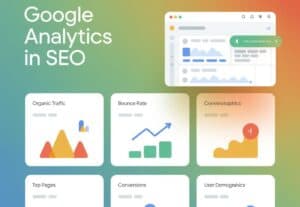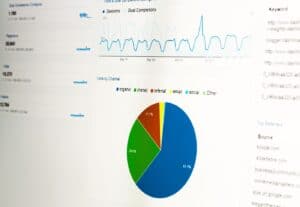Google Analytics in SEO: 3 Powerful Benefits

Introduction
Ever feel like you’re doing everything “right” with SEO but still not seeing results? You’re not alone. Ranking higher in Google is just one piece of the puzzle. The real magic happens when you understand what users do after they land on your site. That’s where Google Analytics in SEO becomes your secret weapon.
If you’ve been guessing instead of analyzing, this guide will open your eyes to a world of data-driven decisions that actually work. From tracking top-performing pages to identifying where users drop off—Google Analytics gives you the insights to refine your SEO and boost organic traffic google analytics in seo.
 Why Google Analytics Matters in SEO
Why Google Analytics Matters in SEO
Think of SEO like dating. Ranking is getting the first date. But what happens during and after the visit? Do they stay, click, read, buy? Or do they bounce in 3 seconds?
Google Analytics in SEO helps answer these vital questions:
Which pages attract the most organic traffic?
Are users bouncing too quickly?
What devices are they using?
Which traffic sources are driving results?
Stat Alert: Websites using data-driven strategies are 23 times more likely to acquire customers (source).
Core Features You Should Be Using
Organic Traffic Tracking
Navigate to Acquisition > All Traffic > Channels > Organic Search
This shows how many users found you via search engines—and which landing pages they came to google analytics in seo.
Landing Pages Report
Check Behavior > Site Content > Landing Pages
See which pages are acting as SEO magnets. You’ll quickly spot which ones to update, promote, or fix.
Bounce Rate & Session Duration
High bounce rate? Short session time? That’s a sign your content may not match search intent google analytics in seo.
Mobile vs Desktop Traffic
Go to Audience > Mobile > Overview
You’ll be surprised how many people visit from mobile. Optimize accordingly.
Goal Tracking
Set up goals for form submissions, product sales, or newsletter sign-ups google analytics in seo.
Route: Admin > Goals > New Goal
 Proven SEO Strategies Using Google Analytics
Proven SEO Strategies Using Google Analytics
Here’s how to use GA like a pro—even if you’re just getting started.
Strategy 1: Improve High-Bounce Pages
Sort landing pages by bounce rate. High bounce? Weak intro, irrelevant content, or bad UX.
Fix: Add better CTAs, improve layout, match headline with intent.
Strategy 2: Update Evergreen Winners
Find top-performing blog posts and keep them fresh.
Example: A blog post from 2021 might still get traffic—update it for 2025 trends google analytics in seo.
Strategy 3: Identify Keyword Opportunities
Use Search Console integration with GA (via this link) to see which queries bring users to your site.
Tip: Cross-check with Google Search Console to see impressions and click-through rates google analytics in seo.
Content Optimization Tips from Analytics Data
Let’s talk content. You can’t optimize what you don’t measure.
Use Site Search Reports
Route: Behavior > Site Search > Search Terms
This shows what users type in your website’s search bar. Create content or FAQs based on this.
Focus on Exit Pages
Route: Behavior > Site Content > Exit Pages
See where people tend to leave. These pages may need better calls-to-action or content flow.
Time on Page
Good content keeps people engaged. If users leave too soon, your value isn’t clear fast enough google analytics in seo.
Analogy: Think of your blog as a party. If people show up and leave immediately, something’s off—music, food, or vibe. Analytics tells you which part needs fixing.
How to Measure Success in SEO with GA
Set up SMART goals (Specific, Measurable, Achievable, Relevant, Time-bound).
Here’s how to track if your SEO is truly working:
Monitor Organic Sessions weekly and monthly
Track Goal Conversions from organic users
Observe Pages/Session to ensure deeper engagement
Measure Scroll Depth using GA4 events or plugins
Real Example:
One of my blog clients had a spike in organic traffic but poor conversions. Using GA, we found the most-read post had no internal links or CTAs. We added a lead magnet and saw a 42% increase in form fills in 2 weeks.
Conclusion
If you’re still flying blind with your SEO, Google Analytics can give you the map—and the fuel. It helps you go beyond vanity metrics and into actionable insights. From bounce rates to landing pages and user flow, the data is already there. You just need to use it.
Start small. Pick one insight today from your analytics dashboard and take action.
Call to Action
Check your top 5 landing pages in GA right now and review their bounce rate
Download our SEO Analytics Checklist to track weekly progress
 FAQs
FAQs
Q1: What is the role of Google Analytics in SEO?
Google Analytics in SEO helps track user behavior, identify top-performing content, and refine your strategy for better rankings and engagement.
Q2: How do I track organic SEO traffic in Google Analytics?
Go to Acquisition > All Traffic > Channels > Organic Search to see traffic from search engines.
Q3: Can Google Analytics help reduce bounce rate?
Yes, by identifying pages with high bounce rates and improving content or CTAs, you can reduce bounce.
Q4: Is GA4 better than Universal Analytics for SEO?
GA4 offers event-based tracking and better user journey analysis, making it more powerful for SEO insights.
Q5: How often should I check Google Analytics for SEO?
Check weekly for traffic trends and monthly for deeper behavior analysis.

 Why Google Analytics Matters in SEO
Why Google Analytics Matters in SEO
 Proven SEO Strategies Using Google Analytics
Proven SEO Strategies Using Google Analytics
 FAQs
FAQs



